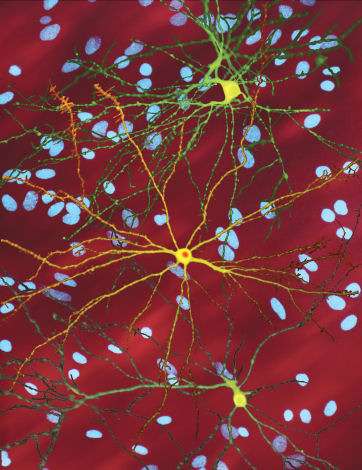Huntington's disease triggered by genetic instability in brain cells, study finds

Huntington's disease is triggered by genetic instability of a particular DNA sequence in brain cells, according to a new study of the lethal neurodegenerative disorder.
If confirmed, the study could lead to new methods to prevent disease onset. It could also result in more accurate prediction of when healthy carriers begin to show symptoms.
The study appears at a time when hope for effective treatment is soaring. Ionis Pharmaceuticals has developed a drug that reduces production of a mutant protein believed to cause the disease. It is now being tested in Huntington's patients by Swiss drug giant Roche.
Huntington's is caused by a mutation in a gene that makes a protein called huntingtin.
Symptoms emerge gradually, including movement disorders, swings in mood and loss of cognitive function. These vary with each person. The disease leads to death.
The age of onset also varies. It's linked to the mutation's severity—a repeat of three DNA letters called CAG.
This mutation was assumed to be static, making an altered huntingtin that gradually causes damage. However, the study found evidence that an increase in the length of mutation during the lifetime of the patient determines the time of onset. When a threshold of consecutive CAGs is crossed, the disease begins to manifest.
Moreover, researchers found the age of onset is affected by at least six genes that maintain and repair DNA. These genes provide new targets for therapies.
The study was published last week in the journal Cell. It's based on information from more than 9,000 people with Huntington's disease.
The study suggests that if the Ionis drug works, it should be given as early as possible before symptoms manifest, said researcher James Gusella, a study leader at Massachusetts General Hospital.
Gusella said that other diseases are caused by these CAG repeats in other genes. So if the mutant huntingtin gene could be stabilized with a drug, such an approach might provide a universal treatment for all these diseases.
Huntington's carriers with enough CAG repeats to trigger the disease go through life knowing they will eventually fall ill. But estimates based on repeats are sometimes inaccurate, leading people to develop symptoms either earlier or later than expected.
Improving these estimates would be of great use to doctors and patients alike, said Rocio Gomez-Pastor, a neuroscientist and Huntington's disease researcher at the University of Minnesota.
"From the physician's point of view, they will be more equipped when they say to patients whether the onset could take place within the next 10 years, or the next 15 years or five years," she said. "That certainly makes a big difference to a family."
University of California, San Diego researcher Don W. Cleveland, whose work led to the Ionis drug, said it could be feasible to develop drugs to stabilize the genome of affected neurons.
"But to be effective, those potential treatments would probably need to be applied prior to disease onset," Cleveland said. "That is a very high bar for therapy development."
The study also reinforces the promise of the Ionis/Roche drug now in testing, Cleveland said.
The study was performed by the Genetic Modifiers of Huntington's Disease (GeM-HD) Consortium. Funders include the CHDI Foundation, National Institutes of Health and the UK Medical Research Council.
©2019 The San Diego Union-Tribune
Distributed by Tribune Content Agency, LLC.












